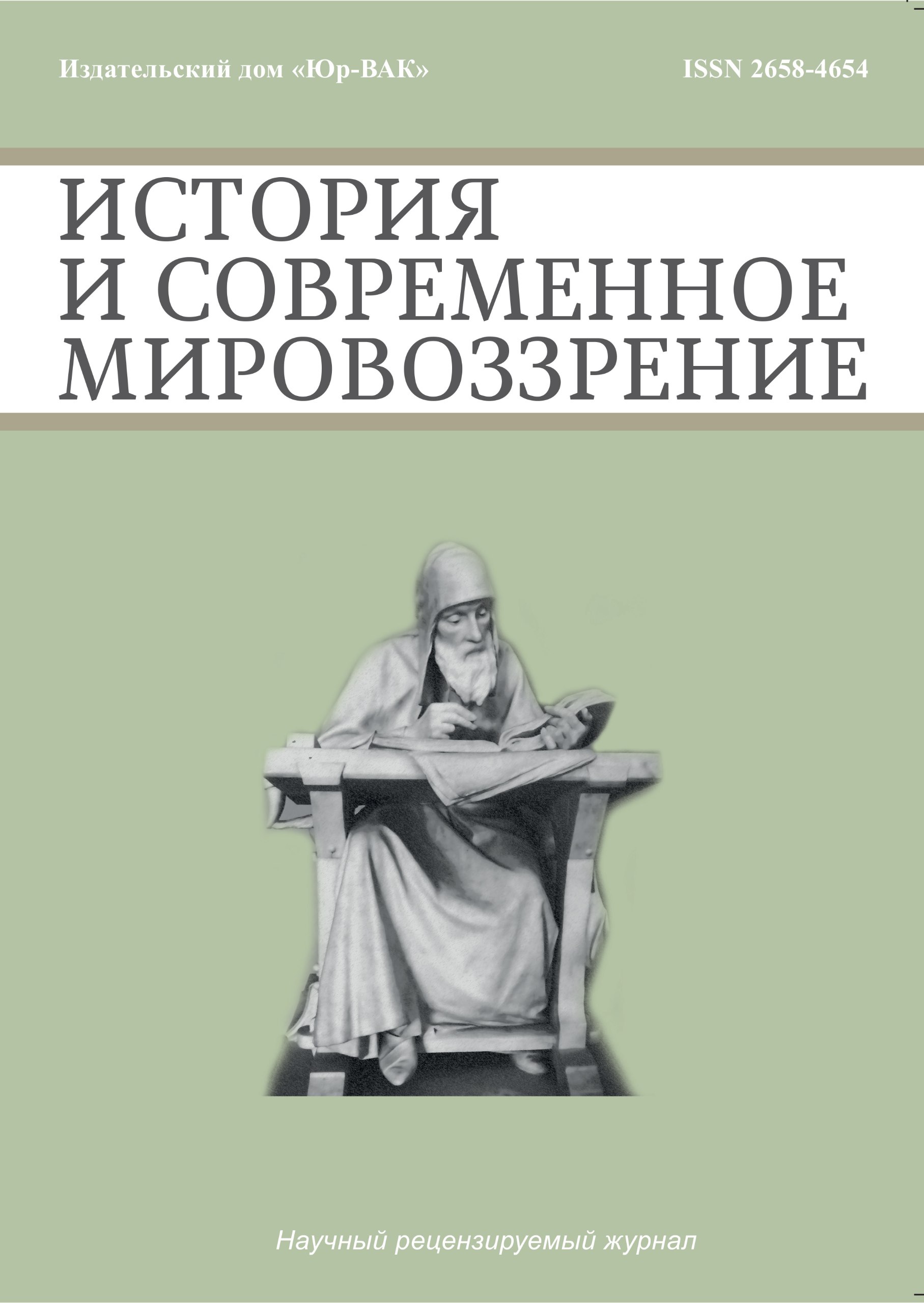Worldview, Thinking and History
- Autores: Gerasimov G.I.1
-
Afiliações:
- Tula Museum of weapons
- Edição: Volume 5, Nº 2 (2023)
- Páginas: 13-22
- Seção: DEBATING ISSUES OF HISTORY
- URL: https://journals.eco-vector.com/2658-4654/article/view/568427
- DOI: https://doi.org/10.33693/2658-4654-2023-5-2-13-22
- EDN: https://elibrary.ru/BFJOXW
- ID: 568427
Citar
Texto integral
Resumo
The goal of this article is to find out the influence of worldview on thinking and historical writing. The theoretical and methodological basis of the study is the author's idealistic approach. The article shows the influence of worldview on the process of thinking and creating an image of the past. The role of ideas in the process of perception of the external world, the formation of experience and imagination is determined. The dependence of the way of thinking on the dominant worldview in the mind of the historian is substantiated. The possibility and conditions for understanding the thinking and logic of people of a certain historical era are revealed. The characteristics of the ways of thinking in different worldview eras are given. The influence of the worldview on the historical actions of people is clarified, and the concept of subjective-objective reality is substantiated. In conclusion, the author concludes that the way of thinking and its logic are determined by the dominant worldview. The worldview and the corresponding way of thinking determine the historical activity of a person, therefore the main task of the historian in creating an image of the past is to understand what ideas underlay historical action.
Texto integral
Sobre autores
Grigory Gerasimov
Tula Museum of weapons
Autor responsável pela correspondência
Email: ggi1957@mail.ru
ORCID ID: 0000-0003-4479-2620
Researcher ID: R-7767-2016
Dr. Sci. (Hist.), Associate Professor, Scientific consultant
Rússia, TulaBibliografia
- Wertheimer M. Productive thinking. Moscow, 1987. 335 p.
- Gerasimov G. Idealistic approach to history: theory, methodology, concepts. Yekaterinburg: Izdatel'skiye resheniya, 2022.
- Davydenkov O., prot. Dogmatic theology. Moscow, 2013. 622 p.
- Lichman, B. V. The history of Russia from ancient times to the end of the XIX century: a textbook for universities/ B. V. Lichman. 2-e izd. Moscow, Izdatel`stvo Yurajt, 2019. 245 p.
- Lichman B.V. Abstracts for the discussion of the concept "goal, meaning in history — goal, meaning in worldview — goal, meaning in the national idea" // History and modern worldview. 2019. V.1. №3. P. 9–13.
- Cassirer E. Favorites. The individual and the cosmos. Moscow-St. Petersburg, 2000. 654 p.
- Cassirer E. Favorites. Experience about a person. Moscow, 1998. 784 p.
- Levy-Bruhl L. Supernatural in primitive thinking. Moscow, 1937. 533 p.
- Losev A.F. Dialectic of myth. Moscow, 2001. 558 p.
- Lossky V. N. Story and traditions // Lossky V. N. Theology and vision of God. Moscow, 2000. 628 p.
- Maidanov A.S. Small Organon of Mythological Creativity // NB: Filosofskiye issledovaniya. 2014. No. 2. P.71–162. http://e-notabene.ru/fr/article_11070.html
- Merkulov I.P. Thinking /Philosophy: An Encyclopedic dictionary. Moscow, 2004. P. 565–569.
- Neisser W. Cognition and reality. Moscow, 1981. 232 p.
- Pereslegin S. How should a Christian think? Christian thinking in the context of other formats of thinking: retrospective and perspective. 2011. http://www.archipelag.ru/agenda/gospel_povestka/konferens_r_vs_r_2011/r_vs_r_2011_text6/
- Rozin V.M. Thinking and creativity. Moscow, 2006. 360 p.
- Ruzavin G.I. Methodology of scientific knowledge. Moscow, 2012. 287 p.
- Stepin B.C. History and philosophy of science. Moscow, 2011. 423 p.
- Stepin V.S., Gorokhov V.G., Rozov M.A. Philosophy of science and technology. Moscow, 1999. M., 1999. 400 p.
- Taylor E. Primitive culture. Moscow, 1939. 567 p.
- Feyerabend P. Selected works on the methodology of science. Moscow, 1986. 542 p.
- Steiner R. Truth and science. Moscow, 1992. 56 p.
Arquivos suplementares









